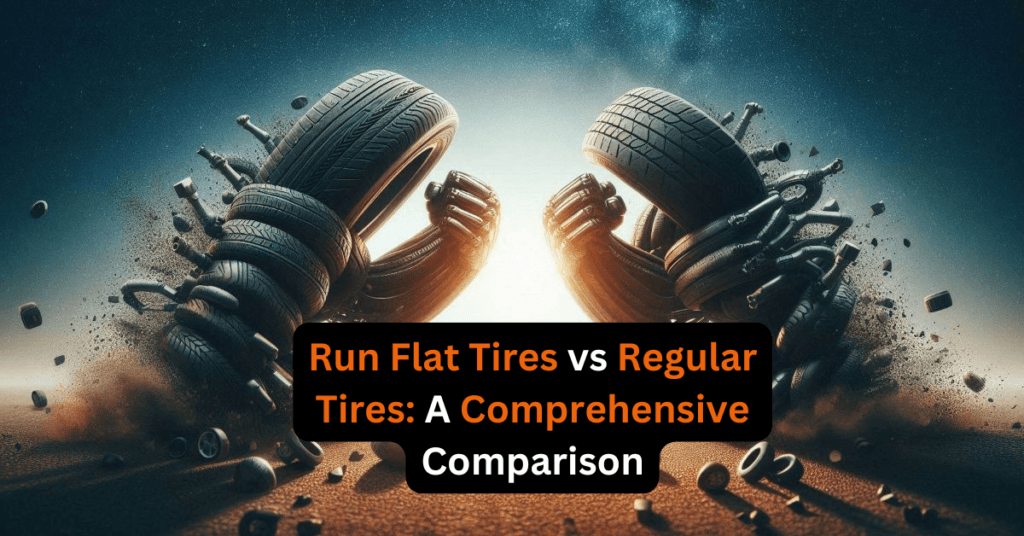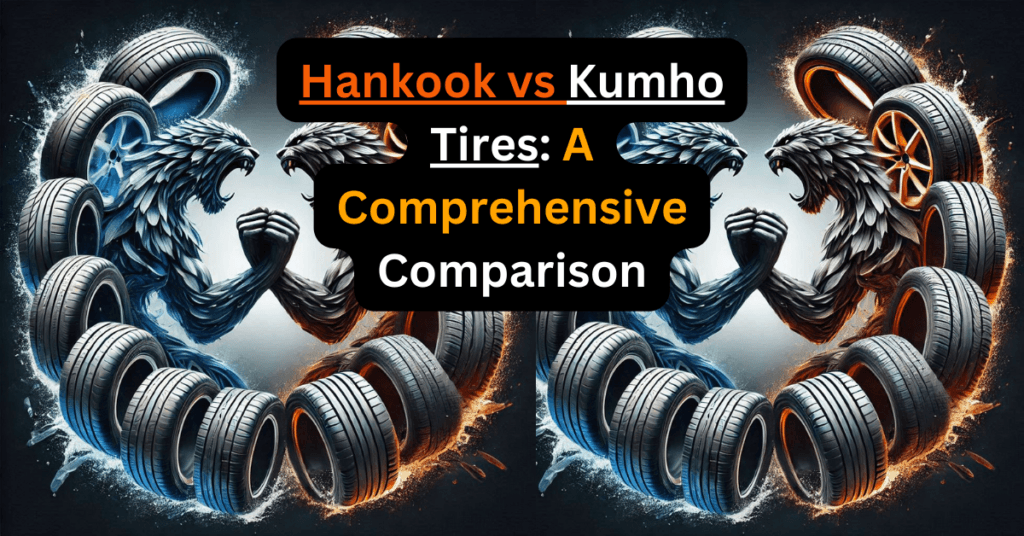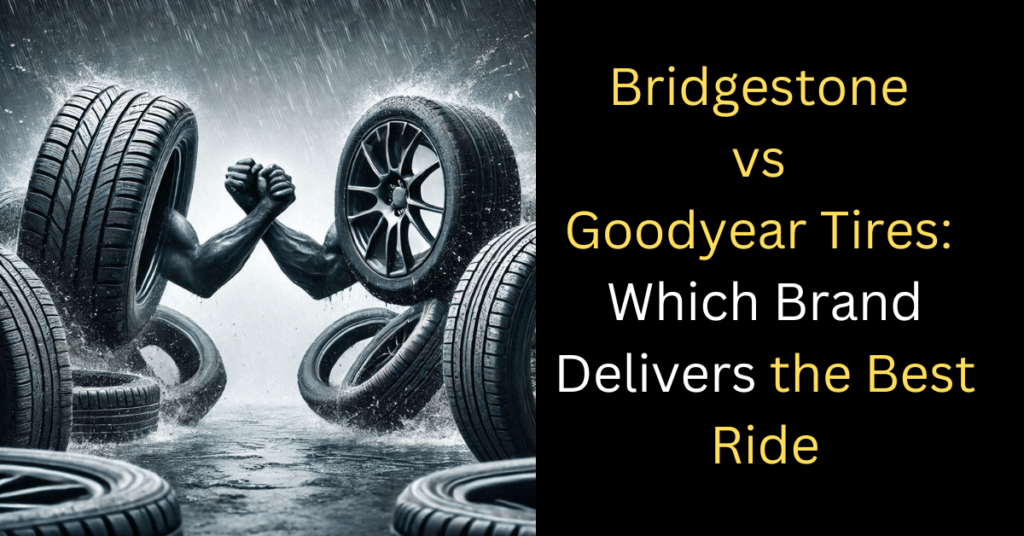Tires are crucial components of any vehicle, yet they often go unnoticed until a problem arises. Your choice of tires significantly impacts your driving experience, safety, and even your wallet.
This article examines two tire industry giants: Continental and Pirelli.
We’ll explore their strengths, weaknesses, and how they compare across various performance categories.
Understanding Tire Basics
Tires are the only part of your vehicle that makes contact with the road. They play a vital role in acceleration, braking, fuel efficiency, and overall ride comfort.
To understand what makes a great tire, we need to consider several key factors:
Tread Pattern
The tread pattern refers to the design of grooves on the tire’s surface. It affects grip and water dispersion.
Different tread patterns are optimized for various driving conditions, such as dry roads, wet surfaces, or off-road terrain.
Rubber Compound
The rubber compound is the mixture of materials that make up the tire. It influences grip, durability, and rolling resistance.
Tire manufacturers constantly refine their rubber compounds to balance these often-competing factors.
Construction
Tire construction involves the layers of rubber, steel, and fabric that give the tire it’s strength and flexibility. The way these layers are arranged and bonded affects the tire’s performance characteristics.
Both Continental and Pirelli have over a century of experience in perfecting these elements, but they’ve taken slightly different approaches to achieve tire excellence.
Continental: The Versatile Performer
Founded in Hanover, Germany in 1871, Continental has built a reputation for producing tires that excel in various conditions. Their tires are known for their versatility, reliability, and consistent performance across different scenarios.
Strengths
1. Wet Performance
Continental tires consistently rank at the top in wet braking and handling tests. Their engineers have developed advanced tread patterns and rubber compounds that maintain exceptional grip even in challenging rainy conditions.
This makes Continental tires a popular choice for drivers in regions with frequent rainfall.
2. Fuel Efficiency
Continental’s EcoPlus Technology has successfully reduced rolling resistance without compromising safety or performance. This innovation translates to improved fuel economy, helping drivers save money at the pump while maintaining confident road grip.
3. Winter Tires
Continental’s expertise in creating tires for harsh European winters has resulted in some of the best cold-weather options on the market. Their winter tires offer excellent traction on snow and ice, making them a go-to choice for drivers in colder climates.
Potential Weaknesses
1. Price
Continental tires often come with a premium price tag. While many drivers find the cost justified by the tires’ performance and longevity, budget-conscious consumers might hesitate at the initial investment.
2. Dry Performance
While Continental tires perform well in dry conditions, they sometimes lag slightly behind ultra-high-performance competitors like Pirelli in this specific area. However, the difference is often minimal for everyday driving scenarios.
Pirelli: The Performance Specialist
Established in Milan, Italy in 1872, Pirelli has deep roots in racing. As the exclusive tire supplier for Formula 1, Pirelli has honed it’s craft on the world’s most demanding racetracks.
This racing heritage influences their consumer tire designs, particularly in high-performance categories.
Strengths
1. Dry Performance
Pirelli tires offer exceptional grip and handling in dry conditions. This makes them a favorite among sports car enthusiasts and drivers who prioritize responsive handling and cornering ability.
2. Noise Reduction
Pirelli’s Noise Cancelling System (PNCS) uses sound-absorbing materials to reduce road noise. This technology provides a quieter, more comfortable ride, especially appealing to luxury car owners and those who spend a lot of time on the highway.
3. Prestige
Pirelli is often the tire of choice for luxury car manufacturers as original equipment. This association with high-end vehicles has helped build Pirelli’s reputation for quality and performance.
Potential Weaknesses
1. Wear
The softer compounds that give Pirelli tires their excellent grip can lead to faster wear, especially in daily driving conditions. This might result in more frequent tire replacements compared to some competitors.
2. Wet Performance
While Pirelli tires perform well in wet conditions, they sometimes fall short of Continental’s exceptional wet-weather capabilities. This difference might be noticeable in regions with frequent rain or on particularly slippery roads.
Head-to-Head Comparison
Now that we’ve examined the strengths and weaknesses of both brands, let’s compare Continental and Pirelli across key performance categories:
1. All-Season Performance
Continental takes the lead in all-season performance. Their ExtremeContact DWS06 tire offers an impressive balance of dry grip, wet traction, and even light snow capability.
This versatility makes it an excellent choice for drivers who experience a variety of weather conditions throughout the year.
Pirelli’s P Zero All Season Plus is a strong contender in this category. It provides good performance across various conditions but doesn’t quite match Continental’s exceptional wet-weather prowess.
2. Ultra-High Performance
Pirelli edges ahead in the ultra-high performance category. Their P Zero line, which benefits from Formula 1 technology, delivers outstanding dry grip and steering response.
These tires excel in performance driving scenarios, offering precise handling and excellent feedback to the driver.
Continental’s ExtremeContact Sport comes close in this category. It offers impressive performance characteristics but falls just short of Pirelli’s ultimate dry performance capabilities.
3. Comfort and Noise
This category results in a close competition, with Pirelli gaining a slight advantage. Pirelli’s PNCS technology effectively reduces road noise, creating a quieter and more comfortable ride.
This feature is particularly noticeable on long highway drives or in luxury vehicles where cabin quietness is a priority.
Continental’s ComfortContact line also performs admirably in this category. Many drivers prefer the smooth and quiet ride these tires provide, making them a popular choice for daily commuters and family vehicles.
4. Longevity and Value
Continental takes the lead in longevity and overall value. Their tires generally offer better tread life, which can offset their higher initial cost.
Over time, this longer lifespan can result in better value for money, as drivers may need to replace their tires less often.
Pirelli’s performance-oriented compounds tend to wear faster, especially under aggressive driving conditions. While this wear rate is often acceptable for performance enthusiasts, it may be a drawback for drivers prioritizing long-term value.
5. Innovation
Both Continental and Pirelli are at the forefront of tire technology, but Continental’s recent advancements give them a slight edge in this category. Their ContiSeal technology, which can automatically seal punctures, shows a commitment to practical innovations that enhance driver safety and convenience.
Continental’s focus on sustainable materials, including their research into dandelion rubber, shows a forward-thinking approach to tire manufacturing. This emphasis on sustainability may become increasingly important as environmental concerns continue to shape the automotive industry.
Choosing the Right Tire for Your Needs
Selecting the best tire brand and model depends on various factors, including your vehicle type, driving style, local climate, and personal priorities. Here’s a guide to help you make the right choice:
If You Prioritize All-Weather Performance and Fuel Efficiency
Continental tires are likely your best bet. Their exceptional wet-weather performance and focus on reducing rolling resistance make them ideal for drivers who want consistent performance in various conditions while maximizing fuel economy.
If You Seek Maximum Dry Grip and Sporty Handling
Pirelli tires, particularly their high-performance lines, will probably suit your needs best. Their racing heritage translates into excellent dry grip and responsive handling, perfect for sports cars or performance-oriented drivers.
If You Value a Quiet, Comfortable Ride
Pirelli’s PNCS tires are hard to beat in this category. However, Continental’s ComfortContact line also offers excellent ride comfort, so it’s worth comparing specific models from both brands.
If Long-Term Value Is Your Main Concern
Continental’s durability gives them an edge in this area. Their tires often last longer, potentially offering better value over time despite a higher initial cost.
Remember, the best tire for you also depends on your specific vehicle, typical driving conditions, and personal preferences. It’s always worthwhile to talk to a tire professional and read recent comparative tests before making your final decision.
Pro Tips for Tire Shoppers
To help you make the most informed decision, consider these extra tips when shopping for tires:
Look Beyond the Brand
While brand reputation is important, it’s crucial to look at specific models within each brand’s lineup. A mid-range Continental tire might outperform an entry-level Pirelli in certain areas, or vice versa.
Compare person tire models as opposed to relying solely on brand name.
Consider Your Driving Style
Your personal driving habits should influence your tire choice. If you’re a spirited driver who enjoys pushing your car’s limits, Pirelli’s performance-oriented tires might be worth the extra wear.
For more relaxed driving, Continental’s balance of performance and longevity could be ideal.
Evaluate Your Climate
Your local weather patterns should play a significant role in your tire selection. If you live in an area with distinct seasons, Continental’s all-season or dedicated winter tires might be the better choice.
In consistently warm, dry climates, Pirelli’s summer tires can truly shine.
Think Long-Term
While Continental tires might cost more upfront, their longer tread life could make them more economical in the long run. Calculate the total cost of ownership by considering both the purchase price and expected tread life.
Read the Fine Print
Pay close attention to treadwear warranties and road hazard protection. These can vary significantly between brands and models and may impact the overall value of your purchase.
The Future of Tire Technology
Both Continental and Pirelli are actively pushing the boundaries of tire technology. Their ongoing research and development efforts promise exciting innovations in the coming years.
Continental’s Sustainability Focus
Continental has set ambitious sustainability goals, aiming to use 100% sustainably produced materials in their tires by 2050. This commitment involves researching alternative materials, such as dandelion rubber, and developing more environmentally friendly production processes.
Pirelli’s Motorsport Innovations
Pirelli’s continued involvement in motorsports, particularly Formula 1, confirms a steady stream of innovations that will eventually make their way to consumer tires. These advancements often focus on enhancing grip, improving handling, and optimizing tire performance under extreme conditions.
Electric Vehicle Tires
As the automotive industry shifts towards electric vehicles (EVs), both Continental and Pirelli are developing tires specifically optimized for EVs’ unique challenges. These tires address issues like increased vehicle weight, instant torque delivery, and the need for reduced rolling resistance to maximize battery range.
Some key features of future EV-specific tires may include:
- Reinforced constructions to handle the extra weight of battery packs
- Specialized tread patterns to manage instant torque delivery
- Advanced rubber compounds that minimize rolling resistance without compromising grip
- Noise-reduction technologies to complement the quieter operation of electric motors
Putting Theory into Practice
Now that you’re armed with knowledge about Continental and Pirelli tires, it’s time to put this information to practical use. Here’s a step-by-step exercise to help you make the best tire choice for your specific needs:
- List your top three priorities for your next set of tires (e.g., wet performance, longevity, comfort).
- Research the current top-rated tires from both Continental and Pirelli that fit your vehicle.
Make note of their key features and how they align with your priorities.
- Compare their performance in your priority areas using recent tire tests and reviews from reputable sources.
- Calculate the total cost of ownership by considering both the purchase price and expected tread life.
This will give you a clearer picture of long-term value.
- If possible, see if you can test drive a vehicle with each tire option.
Many tire retailers offer test drive programs that allow you to experience the tires firsthand.
By going through this process, you’ll choose the best tires for your needs and gain a deeper understanding of how different tire characteristics affect your driving experience.
Frequently Asked Questions
What’s the difference between Continental and Pirelli tires?
Continental tires generally excel in all-weather performance and fuel efficiency, while Pirelli tires are known for their exceptional dry grip and high-performance capabilities. The best choice depends on your specific driving needs and conditions.
Are Continental tires good in the rain?
Yes, Continental tires are renowned for their excellent wet-weather performance. Many of their tire models consistently top the charts in wet braking and handling tests.
Do Pirelli tires wear out quickly?
Pirelli tires, especially their high-performance models, may wear faster than some competitors because of their softer rubber compounds. However, this can vary depending on the specific tire model and driving conditions.
Which brand offers better value for money?
Continental tires often provide better long-term value because of their longer tread life, despite a higher initial cost. However, value can vary depending on your specific needs and driving habits.
Are Pirelli tires good for everyday driving?
While Pirelli is known for high-performance tires, they also offer models suitable for everyday driving. Their all-season tires provide a good balance of performance and durability for daily use.
Do Continental tires reduce fuel consumption?
Many Continental tire models, particularly those featuring their EcoPlus Technology, are designed to reduce rolling resistance, which can lead to improved fuel efficiency.
Are Pirelli tires quieter than Continental?
Pirelli’s Noise Cancelling System (PNCS) technology makes their tires particularly quiet. However, Continental also offers quiet-riding tires, so it’s best to compare specific models.
Which brand is better for winter driving?
Continental has a strong reputation for winter tires, especially in harsh conditions. However, both brands offer winter-specific models, so compare person tire performance for your specific climate.
Do luxury car manufacturers prefer Pirelli or Continental?
Both brands are used by luxury car manufacturers. Pirelli is often associated with high-performance luxury vehicles, while Continental is often chosen for luxury cars emphasizing comfort and all-weather capability.
How do I choose between Continental and Pirelli for my SUV?
Consider your driving conditions, priorities (e.g., comfort, performance, fuel efficiency), and typical weather. Both brands offer SUV-specific tires, so compare person models based on your needs.
Key Takeaways
- Continental excels in all-weather performance and fuel efficiency.
- Pirelli shines in dry grip and high-performance applications.
- Your tire choice should depend on your specific needs, driving style, and local climate.
- Consider long-term value, not just initial cost, when selecting tires.
- Both brands are innovating for a sustainable, high-tech future in tire technology.



